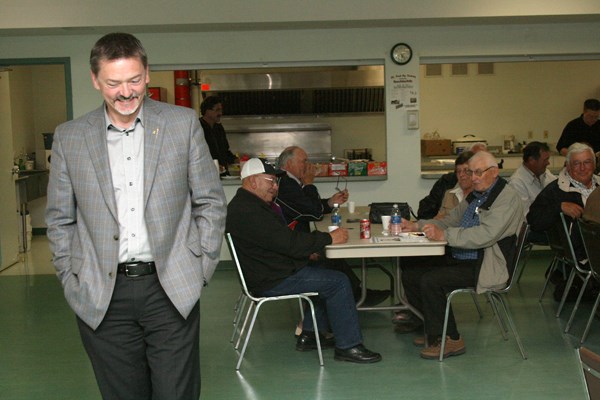Progressive Conservative Party leadership candidate Doug Horner traveled through the Lakeland last week to rally support for his bid to become party leader and Alberta's next premier.
A crowd of around 50 people met with Horner with questions and to hear from the candidate at the Ag Corral in St. Paul on Wednesday.
Horner aims to unite a fractured party, he said before the meeting. “I think that we've moved away from those values and principle-based decision-making that we had as a party in the 70s and 80s and 90s, and I think we need to get back to that."
Horner described himself as a “rurban" MLA, having lived internationally and throughout the province, which combined with cabinet experience gives him a good perspective of the both city and the country, he said.
Horner's first MLA supporter, Minister of Infrastructure Ray Danyluk, traveled on the tour through St. Paul, Vilna, Lac La Biche and Elk Point.
Horner praised Danyluk for his political record and for supporting his leadership bid. “Having him on the team as an advisor, a trusted colleague and a friend is fabulous."
Horner and Danyluk entered the legislature as rookies at the same time, recalled Danyluk at the meeting. Danyluk complemented Horner's tenures as liaison to Canadian Forces and advanced education minister.
While other leadership candidates have raised concerns about former land use Bills 36 and 50, including Rick Orman who has called for a repeal of Bill 36, Horner supports the legislation.
“I think there is some review that needs to be done, but it isn't about repealing the legislation. The legislation is fine," he said, adding that he wants to see all of the seven draft plans before proceeding. “It's what we do with the regulations and the implementation."
Horner called on party members to redefine progressive conservatism in opposition to the hard right wing, “cut to balance the budget" or social credit politics some have associated with progressive conservatism.
“That's not who we are. That's not the guiding principles that are on our website," he said. Instead, innovation, compassion, commitment, fiscal responsibility and family should define the party, he said.
“That's what we need to unite ourselves around. Folks, the problem is we're not united around that. We have a battle between values and principles and dollars and dogma, and that has caused some pretty half baked decisions.
“I am not the unite the right candidate. I am a unite the Progressive Conservatives candidate," he said. “I would be proud to lead the greatest political party this country has ever seen in the greatest jurisdiction in the world."
Wildrose Alliance leader Danielle Smith described Horner as the most honest of the candidates and said she respects him for standing by the decisions he made, but she questioned whether it could be a winning platform. Horner is the only candidate who has not tried to distance himself from the Stelmach record, she said in a phone interview with the Journal.
“If he's going to be running defending that record, then I think that it's going to be very clear that Albertans have a choice. They have a choice between a party that wants to do things the same old way, the PC party, or a party that wants to do things differently … And that's the Wildrose."
Horner called on critics to review their history.
“I was first appointed to cabinet under Premier Klein and I'm very proud of what this government did in terms of the BSE response, in terms of the Rural Development Fund, in terms of the biofuels development," among other accomplishments, he said before last week's meeting.
In response to a question from SPERD trustee Rhonda Lafrance at the Ag Corral, Horner said education is the province's top priority and everything else falls out from underneath education. He said he believes in early childhood development and the province should increase the number of spaces available in post-secondary education.
County of St. Paul Coun. Glen Ockerman asked if Horner expects to see changes to the Municipal Sustainability Initiative (MSI). Horner credited Danyluk as the MSI architect but said “we need to start talking about MSI two now," by looking at what has worked well and some of the things that did not work well, like that municipalities are always waiting for money to come, he said.
The province could flow the money faster and release the regulatory framework “so you can use it for what you need to use it for," he said.
SPERD trustee Ron Rudkowsky said he thought Horner could be the “super-premier" the province needs. School boards are victims of the boom and bust economy of the oil industry, he said, and asked how the province could diversify the economy when other industries have to compete with the high wages of the oil patch.
The role of a premier is to create the environment where your ideas flourish, replied Horner.
St. Paul Mayor Glenn Andersen asked what Horner thought of the inequity in policing cost-sharing across the province, which has some municipalities receiving free policing and other municipalities paying, based on population.
Alberta Association of Municipal Districts and Counties is working on a proposal to address the issue, said Horner. “There's ways that you can transition to a new funding formula," he said. “I'd like to see what they're coming forward with."



